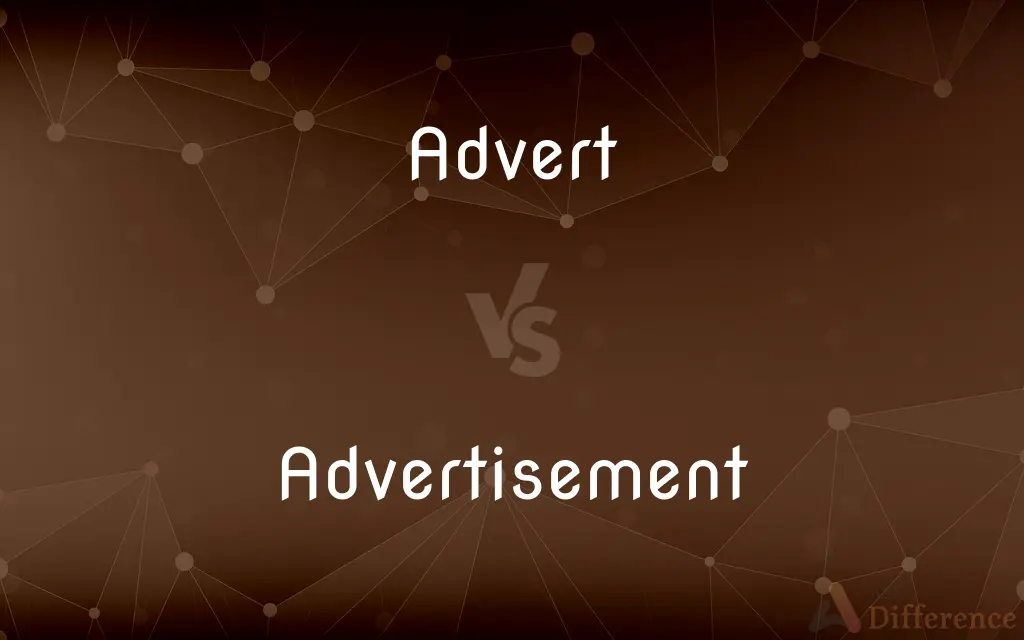Advert vs. Advertisement — What's the Difference?
By Tayyaba Rehman & Urooj Arif — Updated on April 18, 2024
Advert is a shortened form of advertisement, commonly used in informal contexts, focusing on brevity; whereas advertisement is the full term, used more formally and broadly.

Difference Between Advert and Advertisement
Table of Contents
ADVERTISEMENT
Key Differences
Advert is a colloquial abbreviation of advertisement, often used in spoken and informal written English. Whereas advertisement refers to the full, formal term used in both spoken and written contexts, especially in formal communications.
Adverts are typically used in British English to denote any form of promotional content quickly. On the other hand, advertisements are used universally in both American and British English, covering a wider array of promotional forms, including print, digital, and broadcast media.
In digital media, 'advert' is frequently used to describe small, often interactive, pieces of online marketing. Whereas advertisements encompass a broader range of formats including longer commercials, sponsored content, and full-page spreads in magazines or newspapers.
The use of 'advert' suggests a casual or shorthand reference to advertising, suitable for casual conversations or text messages. On the other hand, 'advertisement' is preferred in academic, professional, and formal writing, reflecting a more serious or comprehensive discussion on marketing strategies.
The choice between advert and advertisement can also reflect the speaker's or writer's cultural background, with 'advert' being more common in the UK. Whereas 'advertisement' is widely recognized and used in both the UK and the US, thus having a more global appeal.
ADVERTISEMENT
Comparison Chart
Usage
Informal, especially in British English
Formal, universally accepted
Context
Casual conversations, quick references
Formal discussions, academic writing
Length
Shortened form
Full form
Media Suitability
More common in digital platforms
Suitable for all media types
Cultural Preference
Preferred in the UK
Used globally, including in the US
Compare with Definitions
Advert
Preferred in quick verbal or written exchanges.
Did you like the advert in today’s newspaper?
Advertisement
Suitable for detailed and extensive promotional strategies.
The advertisement features detailed information about the product features.
Advert
Informal term used to describe any marketing material.
We need to design a new advert for our campaign.
Advertisement
Can include various formats like print, digital, broadcast, and more.
The advertisement will run during prime-time TV slots.
Advert
A short form of advertisement, especially in British English.
I saw a catchy advert for a new phone on Instagram.
Advertisement
Commonly used in professional and academic settings.
He published a research paper on the effectiveness of online advertisements.
Advert
Typically used in casual or less formal contexts.
Check out this funny advert I found online.
Advertisement
A notice or announcement in a public medium promoting a product, service, or event.
They placed an advertisement in the local newspaper.
Advert
Often used to refer to digital or online marketing pieces.
The company launched several new adverts on social media.
Advertisement
Formal term used in business and marketing.
The marketing department is preparing the next advertisement campaign.
Advert
To turn attention. Used with to
The board next adverted to compensation issues.
Advertisement
A notice or announcement in a public medium promoting a product, service, or event or publicizing a job vacancy
Advertisements for alcoholic drinks
Advert
To call attention; refer. Used with to
He adverted to the problem in the opening paragraph.
Advertisement
The act of advertising.
Advert
An advertisement.
Advertisement
A notice, such as a poster or a paid announcement in the print, broadcast, or electronic media, designed to attract public attention or patronage.
Advert
An advertisement, an ad.
Advertisement
(marketing) A commercial solicitation designed to sell some commodity, service or similar.
Companies try to sell their products using advertisements in form of placards, television spots and print publications.
Advert
(intransitive) To take notice, to pay attention (to).
Advertisement
A public notice.
The city council placed an advertisement in the local newspaper to inform its residents of the forthcoming roadworks.
Advert
To turn attention to, to take notice of (something).
Advertisement
A recommendation of a particular product, service or person.
The good manners and intelligence of the students are an advertisement for the school.
Advert
(intransitive) To call attention, refer (to).
Advertisement
(obsolete) Notoriety.
Advert
To turn the mind or attention; to refer; to take heed or notice; - with to; as, he adverted to what was said.
I may again advert to the distinction.
Advertisement
(card games) In gin rummy, the discarding of a card of one's preferred suit so as to mislead the opponent into thinking you do not want it.
Advert
A public promotion of some product or service
Advertisement
The act of informing or notifying; notification.
An advertisement of danger.
Advert
Give heed (to);
The children in the audience attended the recital quietly
She hung on his every word
They attended to everything he said
Advertisement
Admonition; advice; warning.
Therefore give me no counsel:My griefs cry louder than advertisement.
Advert
Make a more or less disguised reference to;
He alluded to the problem but did not mention it
Advertisement
A public notice, especially a paid notice in some public print; anything that advertises; as, a newspaper containing many advertisements.
Advert
Make reference to;
His name was mentioned in connection with the invention
Advertisement
A public promotion of some product or service
Common Curiosities
Are advert and advertisement interchangeable?
They can be, depending on the context; 'advert' is casual, while 'advertisement' is more formal.
What is an advertisement?
An advertisement is a formal announcement in media promoting a product, service, or event.
Where is the term 'advert' predominantly used?
The term 'advert' is predominantly used in the UK.
What types of media are adverts found in?
Adverts are commonly found in digital media, including online and social media platforms.
What is an advert?
An advert is a shortened, informal term for advertisement, primarily used in the UK.
How does cultural preference influence the use of advert or advertisement?
Cultural preference influences usage, with 'advert' favored in the UK and 'advertisement' more globally used.
Which term should I use in a formal business presentation?
It's preferable to use 'advertisement' in formal settings such as business presentations.
Which term is more common in the United States?
The term 'advertisement' is more common in the United States.
Can I use advert in academic writing?
In academic writing, it is more appropriate to use the full term 'advertisement.'
Is there a difference in the length of an advert and an advertisement?
No, the length refers to the term itself; 'advert' is simply a shorter form.
Share Your Discovery

Previous Comparison
Inflate vs. Insufflate
Next Comparison
Supplement vs. SupplementaryAuthor Spotlight
Written by
Tayyaba RehmanTayyaba Rehman is a distinguished writer, currently serving as a primary contributor to askdifference.com. As a researcher in semantics and etymology, Tayyaba's passion for the complexity of languages and their distinctions has found a perfect home on the platform. Tayyaba delves into the intricacies of language, distinguishing between commonly confused words and phrases, thereby providing clarity for readers worldwide.
Co-written by
Urooj ArifUrooj is a skilled content writer at Ask Difference, known for her exceptional ability to simplify complex topics into engaging and informative content. With a passion for research and a flair for clear, concise writing, she consistently delivers articles that resonate with our diverse audience.














































